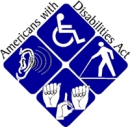LSNYC Files Suit Seeking Equal Access to Courts for New Yorkers with Disabilities

 July 27, 2010, Brooklyn, NY—Today, Legal Services NYC-Brooklyn Branch filed a lawsuit in federal court claiming that the Office of Court Administration (OCA) discriminates against people with disabilities who are mobility-impaired but mentally competent by failing to provide a mechanism by which they can appear in cases pending against them in the Housing Part of the Civil Court of the City of New York. The Plaintiffs claim violations of the Americans with Disabilities Act (ADA), the Rehabilitation Act, and the Due Process and Equal Protection Clauses of the United States Constitution.
July 27, 2010, Brooklyn, NY—Today, Legal Services NYC-Brooklyn Branch filed a lawsuit in federal court claiming that the Office of Court Administration (OCA) discriminates against people with disabilities who are mobility-impaired but mentally competent by failing to provide a mechanism by which they can appear in cases pending against them in the Housing Part of the Civil Court of the City of New York. The Plaintiffs claim violations of the Americans with Disabilities Act (ADA), the Rehabilitation Act, and the Due Process and Equal Protection Clauses of the United States Constitution.
The suit was filed on behalf of Julian Friedman, who is completely incapacitated, disabled and homebound as a result of systolic heart failure and a kidney tumor. When Mr. Friedman was served with court papers seeking his eviction for non-payment of rent, he was given two options. He could appear personally in court, risking the medical and emotional consequences of public collapse, or, he could consent to the court’s solution to have him declared mentally incompetent and have a guardian ad litem appointed to speak on his behalf. Neither option is a reasonable accommodation as defined by the ADA or the Rehabilitation Act. OCA’s failure to provide an appropriate modification of their existing procedures for Mr. Friedman is a violation of his due process and equal protection rights.
“The suit is about the fundamental right of equal access to the courts,” said Legal Services NYC-Brooklyn Branch Acting Project Director Jennifer Levy. “The Office of Court Administration has failed to institute a procedure that enables physically disabled but mentally capable litigants to benefit from the same access to Housing Court and its services as able-bodied litigants.”
Under New York law, guardians ad litem are appropriate only in cases where they are necessary to protect the rights of someone who is mentally incompetent. Mr. Friedman is not mentally incompetent and does not wish to abdicate his right of access to the courts to a guardian.
“I am very upset by this idea,” said Mr. Friedman about the court’s suggestion of a guardian ad litem. ”I am still struggling with the idea that I am physically disabled. I don’t want to be labeled incompetent as well. I feel that it would be humiliating. I am perfectly able to speak for myself. I just need to be given the opportunity to do so.”
Three institutional plaintiffs have joined the suit: Center for Independence of the Disabled, NY (CIDNY), Brooklyn Center for Independence of the Disabled, and Disabled In Action of Metropolitan New York.
Paula Wolff, Direct Services Supervisor at CIDNY, says that of the 3,400 people who sought assistance from CIDNY last year, 45 percent were dealing with housing issues. Approximately 20 percent of the consumers CIDNY works with on an intensive basis call because they are at risk of or presently facing eviction. Ms. Wolff says that referrals to Adult Protective Services for litigants with physical disabilities are inadequate and often inappropriate.
“The court should have policies and procedures that spell out how individuals with physical disabilities can get reasonable accommodations,” said Ms. Wolff. “We would like to see telephone hearings, assistance with completing paperwork and obtaining documents for those facing eviction but not able to participate in the process.”
To provide such modifications would not be onerous or unduly burdensome. Courts in other jurisdictions provide modified procedures by which physically disabled but mentally capable individuals can litigate their cases. New York agencies such as the Human Resources Commission provide for telephonic and home hearings in order to ensure that persons with disabilities can access and protect the benefits to which they are entitled.
“It is so obvious that reasonable modifications to existing procedures are required for respondents with physical disabilities,” said Legal Services NYC-Brooklyn Branch Senior Staff Attorney Karen May Bacdayan, who represents Mr. Friedman. “Everyone who hears about this lawsuit understands our position immediately and feels the same outrage that I did when I realized the level of disregard for fundamental rights that occurs in housing court on a daily basis.”
The Plaintiffs are seeking a declaration that the Defendants’ failure to provide disabled litigants with equal access to housing court violates existing law, and they seek a permanent injunction requiring the Office of Court Administration to develop procedures to accommodate litigants who are unable to make a physical appearance in housing court in a manner that protects their rights.
###
Join us. Demand Justice.
In this extraordinarily challenging moment, your partnership with LSNYC is critical. Please join us by making your gift today.